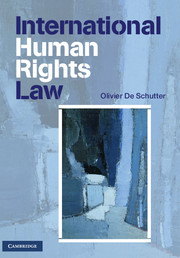Book contents
- Frontmatter
- Contents
- Table of Cases
- Table of Treaties and Conventions
- Table of Comments and Recommendations of Various International Committees
- Introduction
- PART I THE SOURCES
- 1 The emergence of international human rights
- 2 State responsibility and ‘jurisdiction’
- PART II THE SUBSTANTIVE OBLIGATIONS
- PART III THE MECHANISMS OF PROTECTION
- Index
1 - The emergence of international human rights
from PART I - THE SOURCES
- Frontmatter
- Contents
- Table of Cases
- Table of Treaties and Conventions
- Table of Comments and Recommendations of Various International Committees
- Introduction
- PART I THE SOURCES
- 1 The emergence of international human rights
- 2 State responsibility and ‘jurisdiction’
- PART II THE SUBSTANTIVE OBLIGATIONS
- PART III THE MECHANISMS OF PROTECTION
- Index
Summary
INTRODUCTION
Human rights have a logic of their own. This stems from the fact that they have originated in domestic constitutional documents before becoming part of the corpus of international law, and that they regulate the relationships between the State and individuals under their jurisdiction, rather than simply relationships between States. In order to present this logic, this chapter provides an overview of how human rights came to emerge in international law; it discusses the sources of international human rights law; and it locates human rights within general international law. Sections 1 and 2 offer a brief review of the main developments that have occurred at universal and regional levels, leading to the contemporary regime of international human rights. The description of the evolution of the human rights regime, while forming an indispensable background, is left deliberately superficial for the moment. The following chapters shall provide ample opportunity to explore the most controverial issues which have arisen over the course of the emergence of the human rights regime. And the interesting questions arising about the sources of international human rights – such as the role of the emergence of a jus commune in human rights law, the status of human rights in customary international law, or the position of human rights in general international law – are explored in further depth in sections 3 and 4 of this chapter. The readers already familiar with the basic instruments of international human rights should move directly to those sections.
- Type
- Chapter
- Information
- International Human Rights LawCases, Materials, Commentary, pp. 11 - 122Publisher: Cambridge University PressPrint publication year: 2010

